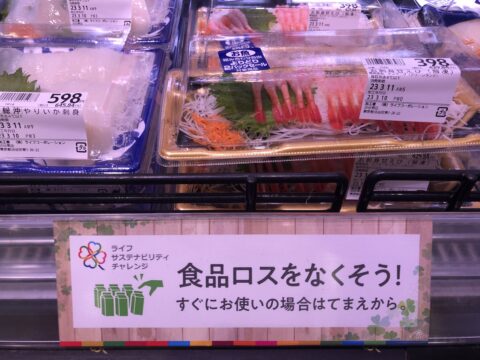DIJ Newsletter 71, Spring 2023

Articles
Catchword temaedori
The reduction of food loss and waste is one of 17 targets of the Sustainable Development Goals (SDGs) declared by the United Nations in 2015. It is part of goal number 12, which defines “responsible consumption and production”.
According to the Ministry of the Environment, Japan’s food loss in 2020 amounted to 5.22 million tons. This figure is roughly equally shared between the business sector (2.75 million tons) and households (2.47 million tons). In order to reduce food waste, the Japanese government declared the reduction of Japan’s food loss and waste (FLW) as a key challenge and set up initiatives toward a carbon-neutral economy. To tackle this problem, the government set a goal of reducing the figure of yearly food loss from 9.8 million tons in 2000 to half this amount by 2030 (World Economic Forum, What are Japan’s top 3 ‘words of the year’ for 2022? 23 December 2022).
One of the recent initiates to reduce food waste is called temaedori てまえどり: “take (toru) from the front (temae)”. Temaedori was jointly implemented by the Ministry of Agriculture, Forestry and Fisheries, the Ministry of the Environment, the Consumer Affairs Agency, and the Japan Franchise Association in June 2021 (Greengrowers, Measures to Reduce Food Waste, 4 January 2022). Temaedori is an initiative to encourage customers to select and buy products from the front row of shelves instead of picking products from the very back. As elsewhere, Japanese consumers too tend to take products from the back of the shelves where the freshest products with the longest expiration dates are usually placed by supermarkets. As a consequence, products in the front row with shorter expiration dates often go to waste (JCCU, ‘TEMAEDORI’ was selected as one of the top 10 words in Japan’s 2022 New Words and Buzzwords Awards, 20 December 2022).

Temaedori is a concrete measure following “The Act on Promotion of Food Loss and Waste Reduction”, which was enacted in October 2019. The act aims to incentivize entities of all levels, including national and local governments, companies and consumers to jointly promote and work together to reduce food loss. Temaedori is an example of national and local governments’ attempt to educate and raise awareness among companies and consumers (Government of Japan, Initiatives to Reduce Food Loss and Waste, September 2022).
To discourage consumers from picking products from the back of the shelves, the Japan Franchise Association, the Consumer Affairs Agency, and the Ministry of the Environment cooperate and disseminate educational materials to retail stores and supermarkets as well as consumers. Politicians such as Nomura Tetsuro, Minister of Agriculture, Forestry and Fisheries since 2022, have actively encouraged the public to join and support the campaign of temaedori together with the related concept of tabekiri – eat up everything without wasting food (World Economic Forum, What are Japan’s top 3 ‘words of the year’ for 2022? 23 December 2022).
Temaedori became so popular that the term was selected as one of the top ten words in the “U-can New Words and Buzzwords Award” in 2022. The “U-can New Words and Buzzwords Award” is an annual event since 1984 organized by the Japanese publisher Jiyu Kokumin Sha. It highlights newly used words and buzzwords which have become popular in Japan among the population and media (JCCU, ‘TEMAEDORI’ was selected as one of the top 10 words in Japan’s 2022 New Words and Buzzwords Awards, 20 December 2022).
Indeed, many prefectures and cities follow this campaign. Yamagata prefecture included temaedori in its sustainability strategy and actively promotes the concept. It even developed a mascot called “zero waste boy” (gomi zero kun ごみゼロくん) and implemented a “zero waste day” (gomi zero no hi ごみゼロの日) every year on May 30. Many companies support the prefecture’s temaedori initiative (Yamagata Prefecture Government, Sugu taberu toki wa shohindana no temae kara toru ‘temaedori’ kyanpen jisshichu! 28 December 2022). Another example is Kodaira City in Tokyo, which implemented its campaign in October, in the so-called “Food Loss Reduction Month”. The “Act on Promotion of Food Loss and Waste Reduction” set October as “Food Loss Reduction Month” to increase understanding and awareness of the necessity to reduce food loss and waste. Kodaira City cooperates with companies such as Seven-Eleven Japan to encourage customers to develop eco-friendly consumption behaviour (Kodaira City, Reducing food loss by “Tezendori”, 1 November 2022).
Markus Heckel is head of the DIJ’s research cluster Sustainability and Resilience.